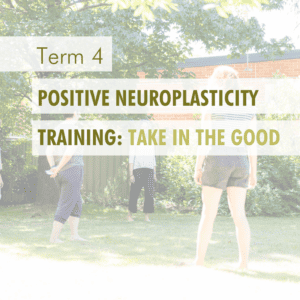positive neuroplasticity training: TAKE IN THE GOOD
A SIX WEEK PROGRAM TO CHANGE YOUR BRAIN FOR THE BETTER.
Hardwire peace of mind, contentment and self-compassion into your brain.
In this exciting 6-week course developed by Dr Rick Hanson, learn how to turn fleeting everyday experiences into lasting inner strengths. This reduces the negative bias, enables faster recovery from setbacks and difficulties and increases capacity for joy, resilience and connection.
It is a pre-requisite to have undertaken some training and practice in mindfulness before this course.
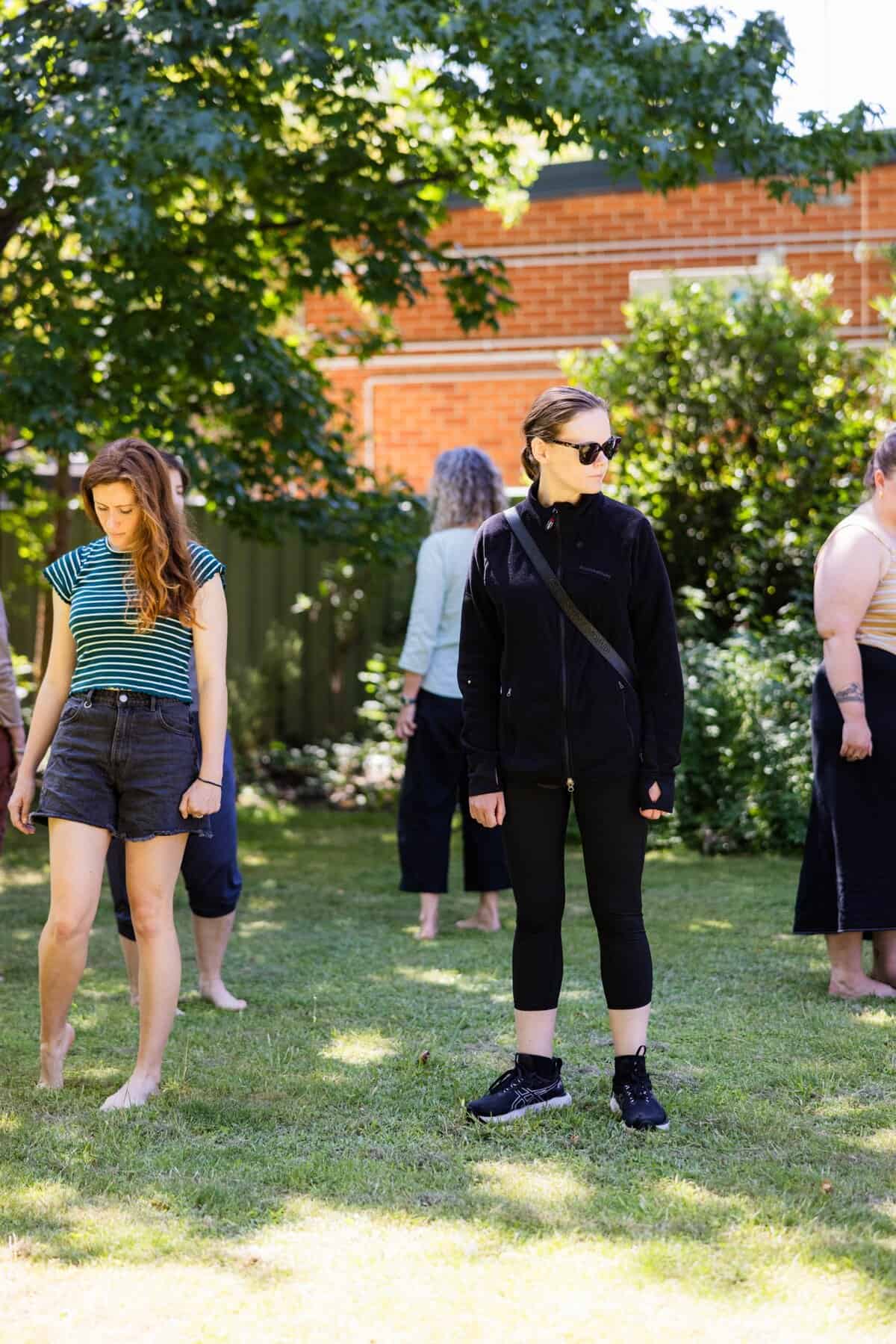
Beat the brain’s negativity bias and fill yourself with calm strength, confidence and joy.
A six week evidence-based program to learn how to:

beat the brain’s negativity bias

increase happiness and resilience

hardwire peace of mind and contentment
The positive neuroplasticity training is so empowering — it’s amazing to be able to gradually change the way I move through the world by choosing to focus on what is beneficial. — Joo-Inn, 2019 PNT participant
In a peer-reviewed study on these methods, people reported statistically significant increases in happiness, resilience, and compassion, and decreases in anxiety and depression.
What are the possible benefits?
Peer reviewed research on Positive Neuroplasticity Training points to a range of benefits:
More satisfaction in daily life
Greater sense of safety
Develop internal supports
Happier
Stronger feelings of connection
Decrease anxiety and depression
I experienced a re-awakening of joy and pleasure in my life. — PNT participant
learn to hardwire your brain
Everything we do creates connections within the network of our brain, and the more you repeat something, the stronger that connection gets. These connections control our reactions, emotions, and behaviours, and affect our overall well-being.
PNT teaches the skills to hardwire peace of mind, contentment and self-compassion into your brain.

How positive neuroplasticity helps
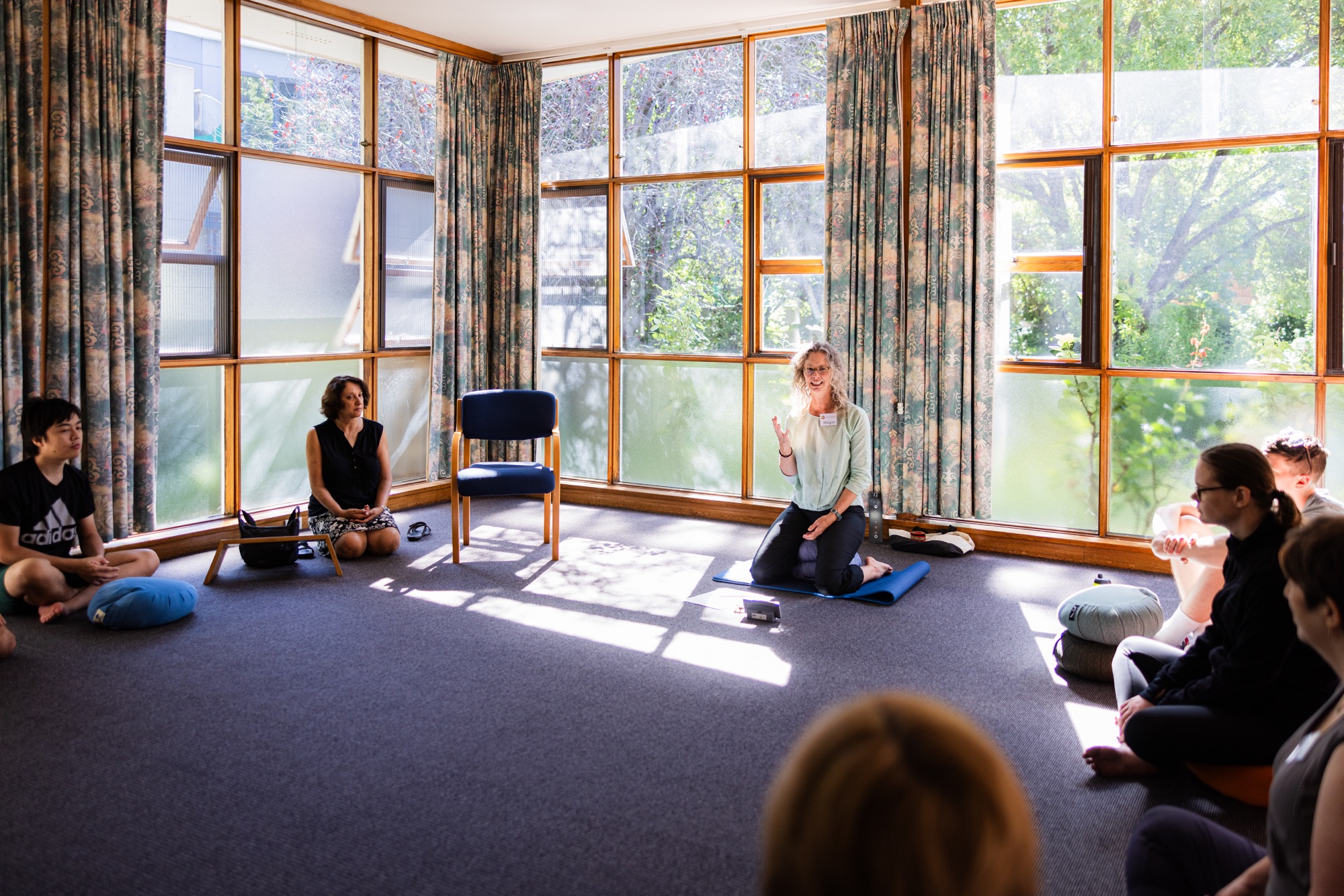
Over 6 weeks (once a week for 3 hours) learn how to meet your needs with simple practices tailored for you.
As you practice, you may experience growing happiness, resilience, peace and internal support.
These qualities can radically change the way you experience life and your sense of safety, satisfaction and connection.
I’ve found new ways to meditate and built a basis for habitually seeing the good in me – and in situations I encounter. — 2022 PNT participant
What does the positive neuroplasticity course include?
18 hours of face-to-face instruction
3 hour class once a week for 6 weeks
Positive neuroplasticity training
Radically change the way you experience life
A range of learning approaches
Brief lectures, group discussion and experiential activities
Handbook
A printed handbook to help guide you through the course
Home practices
Learn a new practice each week that builds on the previous ones
Digital downloads of guided meditations and teachings
Lifetime access to our members-only online library
Turn fleeting everyday experiences into lasting inner strengths.
course outline
class 1:
Overview of the essence of Positive Neuroplasticity, including the role of mindfulness and overcoming the brain’s negativity bias
class 2:
Having, enriching and absorbing positive experiences, including: creating and intensifying positive experiences & being on your own side
class 3:
Linking positive and negative material including, recognising your needs and growing the inner resources you need the most
class 4:
Growing strengths for feeling safer, including reducing anxiety and managing threats with calm strength
class 5:
Growing strengths for feeling more satisfied, including staying motivated and pursuing big goals without stress
class 6:
Growing strengths for feeling more connected, including increasing a genuine sense of self-worth
I write to say that it worked! And also to say a proper thank you for your commitment to this stuff and for your determination to share it with the grace, care and love that you do. — Richard Wigley, PNT participant
Meet your POSITIVE NEUROPLASTICITY teacher

Megan Layton
Director, Senior MBSR, PNT, Self-Compassion and Yoga teacher
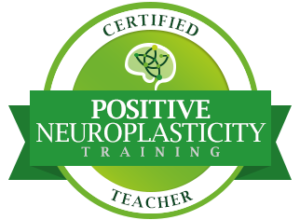
Megan Layton is the Director of Simply Mindful, a senior Mindfulness and Yoga teacher and Mental Health Social Worker with more than 25 years experience.
She has been endorsed and trained by Dr Rick Hanson to teach PNT.
Megan has been helping people integrate positive neuroplasticity into their lives and their practice for many years.
Thank you again for all you’ve taught me this year; it’s benefited me
greatly and you’ll be glad to hear that meditating once or twice a day has been part of my day since I finished the PNT course. — Jeremy, PNT participant
I adored Megan’s grounded, loving and compassionate approach. — Simply Mindful program participant
Our venue: the Gathering Place
Our programs are offered at our beautiful northside Canberra venue. We are delighted to share this beautiful place of peace, meditation, contemplation, healing, renewal and learning.
By taking in the good, you become more able to deal with the bad.
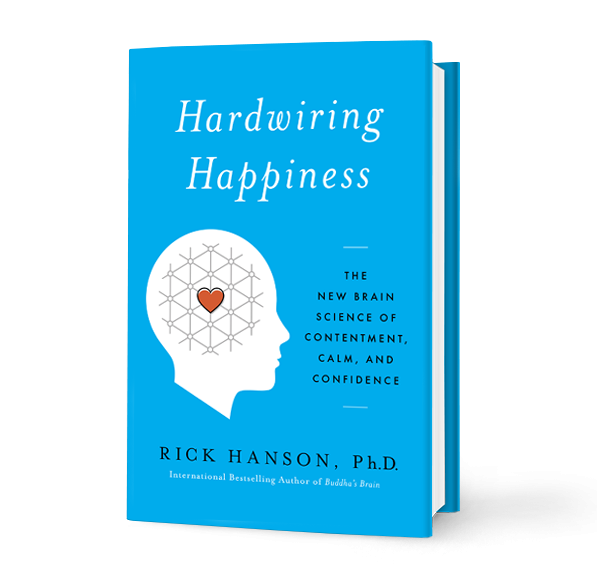
Recommended preparation
We highly recommend you purchase Rick Hanson’s book Hardwiring Happiness to use as a resource throughout the course.
We also recommend that you have training and practice in mindfulness prior to this course. This is to ensure you have the necessary foundation of understanding and skills to benefit fully from this program and be able to apply it. MBSR is the recommended program; however, other reputable mindfulness programs may be sufficient.
To learn more about the science of changing your brain for the better, visit the offical Positive Neuroplasticity website.
enrol now in positive neuroplasticity training
Choose a start date below. (We generally run 1-2 courses per year, so check back later if you don’t see a date that suits you.)
Answers to your questions
What is Positive Neuroplasticity Training?
Positive Neuroplasticity Training is an educational program, backed by evidence, in which you will learn how to hardwire peace of mind, contentment, and self-compassion into your brain. Over 6 interesting and enjoyable weeks understand Rick's simple HEAL framework and most importantly, learn to put it into practice in a supportive environment with a skilled experienced teacher.
Is this therapy?
The Positive Neuroplasticity Training is not therapy, nor is it a substitute for therapy. It isn’t intended to be used as a treatment for any specific physical or mental health condition.
Who is this for?
Anyone can take the course and benefit from the training. Coaches, counsellors, educators, healthcare professionals, human resources trainers and people in related roles may find it especially useful.
Will this course help me with my everyday problems?
In a peer-reviewed study on these methods, people reported statistically significant increases in happiness, resilience, and compassion, and decreases in anxiety and depression.
Participants have told us that they found Positive Neuroplasticity Training to have a beneficial impact on their lives. Our students have said,
"I found this program to be empowering. Whereas previously I was feeling somewhat like a victim, learning the techniques has helped me to realise that I must take action to save/ help myself. I learnt new techniques for overcoming burnout and depression."
"I've gained a sense of my own worth and increasing skills in managing the negative bias and inner critic. I feel I have more inner resources to draw on."
People generally find this training is a useful resource for managing typical range
experiences of anxiety, blue mood, stress, loneliness, and interpersonal conflicts.
If you are already working through some of these challenges with a psychotherapist, it’s a good idea to let them know that you are enrolling in this training.
Can this course help with more serious problems?
People with significant psychological issues or a history of suicidality, complex trauma, psychosis, or other severe mental health issues may find that the Positive Neuroplasticity Training stirs things up too much. The course doesn’t include the kind of individualised support required to safely navigate these experiences.
Instead, we strongly advise that you seek one-on-one professional treatment. If you are in crisis, we urge you to access emergency services without delay.
If you already have excellent individualised support in place to manage your mental health condition, and are keen to begin the training, please chat with us before enrolling.
I want to take the PNT course, but I don't live in Canberra.
We typically offer the PNT course face to face only, so you do need to be able to get to Canberra. 🙂
If this is impossible and you are very keen to take the course with Megan, please contact us as we may consider offering it online if there's enough interest.
Also, Dr Rick Hanson maintains a calendar of upcoming PNT classes around the globe - you can see it here.
